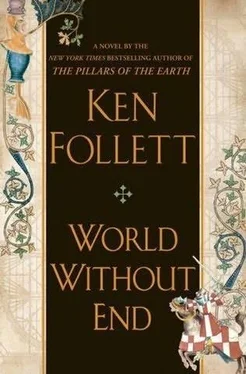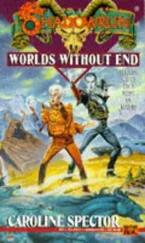“We could do all that,” she said.
Her father snorted. “If only.”
“Why not, Papa?”
“Shiring is an independent borough, with a royal charter. The merchant guild there has the power to organize things for the benefit of the wool merchants. Kingsbridge belongs to the priory-”
Petranilla put in: “For the glory of God.”
“No doubt,” Edmund said. “But our parish guild can’t do anything without the priory’s approval – and priors are cautious and conservative people, my brother being no exception. The upshot is that most improvement plans get rejected.”
Buonaventura went on: “Because of my family’s long association with you, Edmund, and your father before you, we have continued to come to Kingsbridge; but in hard times we can’t afford to be sentimental.”
“Then let me ask you a small favour, for the sake of that long association,” Edmund said. “Don’t make a final decision yet. Keep an open mind.”
That was clever, Caris thought. She was struck – as she often was – by how shrewd her father could be in a negotiation. He did not argue that Buonaventura should reverse his decision, for that would just make him dig his heels in. The Italian was much more likely to agree not to make the decision final. That committed him to nothing, but left the door open.
Buonaventura found it hard to refuse. “All right, but to what end?”
“I want the chance to improve the fair, and especially that bridge,” Edmund replied. “If we could offer better facilities here at Kingsbridge than they have at Shiring, and attract more sellers, you would continue to visit us, wouldn’t you?”
“Of course.”
“Then that’s what we’ll have to do.” He stood up. “I’ll go and see my brother now. Caris, come with me. We’ll show him the queue at the bridge. No, wait, Caris, go and fetch your clever young builder, Merthin. We might need his expertise.”
“He’ll be working.”
Petranilla said: “Just tell his master that the alderman of the parish guild wants the boy.” Petranilla was proud that her brother was alderman, and mentioned it at every opportunity.
But she was right. Elfric would have to release Merthin. “I’ll go and find him,” Caris said.
She put on a cape with a hood and went out. It was still raining, though not as heavily as yesterday. Elfric, like most of the leading citizens, lived on the main street that ran from the bridge up to the priory gates. The broad street was crowded with carts and people heading for the fair, splashing through puddles and streamlets of rain.
She was eager to see Merthin, as always. She had liked him ever since All Hallows’ Day ten years ago, when he had appeared at archery practice with his home-made bow. He was clever and funny. Like her, he knew that the world was a bigger and more fascinating place than most Kingsbridge citizens could conceive. But six months ago they had discovered something that was even more fun than being friends.
Caris had kissed boys before Merthin, though not often: she had never really seen the point. With him it was different, exciting and sexy. He had an impish streak that made everything he did seem mildly wicked. She liked it when he touched her body, too. She wanted to do more – but she tried not to think about that. ‘More’ meant marriage, and a wife had to be subordinate to her husband, who was her master – and Caris hated that idea. Fortunately she was not forced to think about it yet, for Merthin could not marry until his apprenticeship was over, and that was half a year away.
She reached Elfric’s house and stepped inside. Her sister, Alice, was in the front room, at the table, with her stepdaughter, Griselda. They were eating bread with honey. Alice had changed in the three years since she had married Elfric. Her nature had always been harsh, like Petranilla’s, and under the influence of her husband she had become more suspicious, resentful and ungenerous.
But she was pleasant enough today. “Sit down, sister,” she said. “The bread is fresh this morning.”
“I can’t, I’m looking for Merthin.”
Alice looked disapproving. “So early?”
“Father wants him.” Caris went through the kitchen to the back door and looked into the yard. Rain fell on a dismal landscape of builder’s junk. One of Elfric’s labourers was putting wet stones into a barrow. There was no sign of Merthin. She went back inside.
Alice said: “He’s probably at the cathedral. He’s been making a door.”
Caris recalled that Merthin had mentioned this. The door in the north porch had rotted, and Merthin was working on a replacement.
Griselda added: “He’s been carving virgins.” She grinned, then put more bread-and-honey into her mouth.
Caris knew this, too. The old door was decorated with carvings illustrating the story Jesus told on the Mount of Olives, about the wise and foolish virgins, and Merthin had to copy it. But there was something unpleasant about Griselda’s grin, Caris thought; almost as if she were laughing at Caris for being a virgin herself.
“I’ll try the cathedral,” Caris said, and with a perfunctory wave she left.
She climbed the main street and entered the cathedral close. As she threaded her way through the market stalls, it seemed to her that a dismal air hung over the fair. Was she imagining it, because of what Buonaventura had said? She thought not. When she recalled the Fleece Fairs of her childhood, it seemed to her that they had been busier and more crowded. In those days, the priory precincts had not been large enough to contain the fair, and the streets all around had been obstructed by unlicensed stalls – often just a small table covered with trinkets – plus hawkers with trays, jugglers, fortune tellers, musicians, and itinerant friars calling sinners to redemption. Now it seemed to her there might have been room for a few more stalls within the precincts. “Buonaventura must be right,” she said to herself. “The fair is shrinking.” A trader gave her a strange look, and she realized she had spoken her thoughts out loud. It was a bad habit: people thought she was talking to spirits. She had taught herself not to do it, but she sometimes forgot, especially when she was anxious.
She walked around the great church to the north side.
Merthin was working in the porch, a roomy space where people often held meetings. He had the door standing upright in a stout wooden frame that held it still while he carved. Behind the new work, the old door was still in place in the archway, cracked and crumbling. Merthin stood with his back to her, so that the light fell over his shoulders on to the wood in front of him. He did not see her, and the sound of the rain drowned her footsteps, so she was able to study him for a few moments unnoticed.
He was a small man, not much taller than she. He had a large, intelligent head on a wiry body. His small hands moved deftly across the carving, shaving fine curls of wood with a sharp knife as he shaped the images. He had white skin and a lot of bushy red hair. “He’s not very handsome,” Alice had said, with a twist of her lip, when Caris admitted she had fallen in love with him. It was true that Merthin did not have the dashing good looks of his brother, Ralph, but Caris thought his face was quite marvellous: irregular and quirky and wise and full of laughter, just as he was.
“Hello,” she said, and he jumped. She laughed. “It’s not like you to be so easily spooked.”
“You startled me.” He hesitated, then kissed her. He seemed a little awkward, but that sometimes happened when he was concentrating on his work.
She looked at the carving. There were five virgins on each side of the door, the wise ones feasting at the wedding, and the foolish ones outside, holding their lamps upside down to show that they were empty of oil. Merthin had copied the design of the old door, but with subtle changes. The virgins stood in rows, five on one side and five on the other, like the arches in the cathedral; but, in the new door, they were not exactly alike. Merthin had given each girl a sign of individuality. One was pretty, another had curly hair, one wept, another closed one eye in a mischievous wink. He had made them real, and the scene on the old door now looked stiff and lifeless by comparison. “It’s wonderful,” Caris said. “But I wonder what the monks will think.”
Читать дальше












